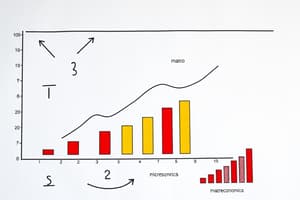Podcast
Questions and Answers
What is defined as the value of the next best alternative forgone when making a choice?
What is defined as the value of the next best alternative forgone when making a choice?
- Supply
- Scarcity
- Demand
- Opportunity Cost (correct)
In which market structure do many firms sell differentiated products with some price control?
In which market structure do many firms sell differentiated products with some price control?
- Perfect Competition
- Monopoly
- Oligopoly
- Monopolistic Competition (correct)
Which economic theory emphasizes limited government intervention and free markets?
Which economic theory emphasizes limited government intervention and free markets?
- Supply-Side Economics
- Classical Economics (correct)
- Behavioral Economics
- Keynesian Economics
What is the economic indicator that measures the total value of all goods and services produced within a country?
What is the economic indicator that measures the total value of all goods and services produced within a country?
Which branch of economics focuses primarily on the behavior of individual consumers and firms?
Which branch of economics focuses primarily on the behavior of individual consumers and firms?
Which of the following describes the difference between a country’s exports and imports?
Which of the following describes the difference between a country’s exports and imports?
What type of market structure is characterized by a single firm controlling the entire market?
What type of market structure is characterized by a single firm controlling the entire market?
What is primarily managed by central bank actions aiming to control inflation and stabilize currency?
What is primarily managed by central bank actions aiming to control inflation and stabilize currency?
Flashcards are hidden until you start studying
Study Notes
Key Concepts in Economics
-
Definition: Economics is the study of how individuals, businesses, and societies allocate scarce resources to satisfy unlimited wants.
-
Branches of Economics:
- Microeconomics: Focuses on individual agents (consumers and firms) and their decisions.
- Macroeconomics: Studies the economy as a whole, including inflation, unemployment, and GDP.
-
Basic Economic Principles:
- Scarcity: Limited resources versus unlimited wants creates the need for choice.
- Opportunity Cost: The value of the next best alternative forgone when making a choice.
- Supply and Demand: Prices and quantities of goods/services determined by market interactions.
- Demand: Quantity of a good consumers are willing to purchase at various prices.
- Supply: Quantity of a good that producers are willing to sell at various prices.
-
Market Structures:
- Perfect Competition: Many firms, identical products, easy entry/exit.
- Monopolistic Competition: Many firms, differentiated products, some price control.
- Oligopoly: Few firms dominate, products may be identical or differentiated, potential for collusion.
- Monopoly: Single firm controls the entire market, significant barriers to entry.
-
Economic Indicators:
- Gross Domestic Product (GDP): Total value of all goods and services produced within a country.
- Unemployment Rate: Percentage of the labor force that is unemployed and actively seeking work.
- Inflation Rate: Rate at which the general level of prices for goods and services rises.
-
Fiscal Policy: Government policy regarding taxation and spending to influence the economy.
-
Monetary Policy: Central bank actions to manage the money supply and interest rates to control inflation and stabilize currency.
-
International Economics:
- Trade Balance: Difference between a country’s exports and imports.
- Exchange Rates: Value of one currency in terms of another, affecting international trade dynamics.
-
Economic Theories:
- Classical Economics: Emphasizes free markets, limited government intervention.
- Keynesian Economics: Advocates for government intervention to manage economic cycles.
- Supply-Side Economics: Focuses on boosting supply through tax cuts and deregulation.
-
Current Issues in Economics:
- Globalization and its impact on local economies.
- Income inequality and its implications for growth and social stability.
- Sustainability and the economics of climate change.
These notes cover foundational aspects of economics, illustrating essential principles and structures that define the discipline.
Economics Definition and Branches
- Economics studies how individuals, businesses, and societies allocate scarce resources to satisfy unlimited wants.
- Microeconomics focuses on individual decisions made by consumers and firms.
- Macroeconomics studies the economy as a whole, examining inflation, unemployment, and GDP.
Basic Economic Principles
- Scarcity: Limited resources clash with unlimited wants, forcing choices.
- Opportunity Cost: The value of the best alternative forgone when making a choice.
- Supply and Demand: Market interactions determine prices and quantities of goods and services.
- Demand: The quantity consumers are willing to buy at different prices.
- Supply: The quantity producers are willing to sell at different prices.
Market Structures
- Perfect Competition: Many firms, identical products, easy entry and exit.
- Monopolistic Competition: Many firms, differentiated products, some price control.
- Oligopoly: Few firms dominate, products may be similar or different, potential for collusion.
- Monopoly: A single firm controls the entire market, with significant barriers to entry.
Economic Indicators
- Gross Domestic Product (GDP): Measures the total value of goods and services produced within a country.
- Unemployment Rate: Percentage of the labor force actively seeking work but unemployed.
- Inflation Rate: The rate at which prices for goods and services rise.
Economic Policy
- Fiscal Policy: Government actions involving taxation and spending to influence the economy.
- Monetary Policy: Central bank actions to manage money supply and interest rates, controlling inflation and stabilizing currency.
International Economics
- Trade Balance: The difference between a country's exports and imports.
- Exchange Rates: The value of one currency compared to another, impacting international trade.
Economic Theories
- Classical Economics: Emphasizes free markets and limited government intervention.
- Keynesian Economics: Advocates for government intervention to manage economic cycles.
- Supply-Side Economics: Focuses on stimulating supply through deregulation and tax cuts.
Current Economic Issues
- Globalization and its impact on local economies.
- Income inequality and its implications for growth and social stability.
- Sustainability and the economics of climate change.
Studying That Suits You
Use AI to generate personalized quizzes and flashcards to suit your learning preferences.




